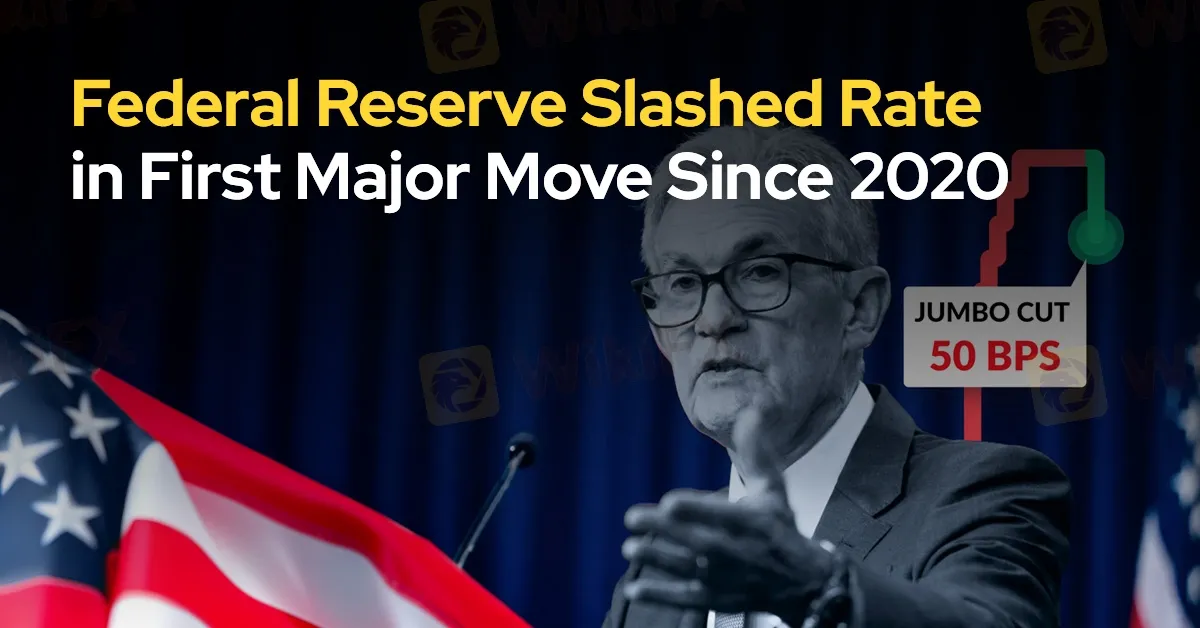简体中文
繁體中文
English
Pусский
日本語
ภาษาไทย
Tiếng Việt
Bahasa Indonesia
Español
हिन्दी
Filippiiniläinen
Français
Deutsch
Português
Türkçe
한국어
العربية
Federal Reserve Slashed Rate in First Major Move Since 2020
Abstract:The U.S. Federal Reserve has made its first interest rate cut in over four years, lowering the benchmark rate by half a percentage point. This significant reduction, which exceeds the typical quarter-point adjustments, signals growing concerns within the central bank about its ability to maintain control over inflation.

The U.S. Federal Reserve has made its first interest rate cut in over four years, lowering the benchmark rate by half a percentage point. This significant reduction, which exceeds the typical quarter-point adjustments, signals growing concerns within the central bank about its ability to maintain control over inflation. The Federal Open Market Committee (FOMC) has been focused on ensuring that inflation remains manageable while promoting maximum employment.
According to the Federal Reserve, the committee is working to achieve its long-term goals of 2% inflation and full employment. The FOMC indicated increased confidence that inflation is trending sustainably toward the 2% target, though it acknowledged that balancing these objectives continues to pose risks. The rate cut brings the federal funds rate to a range of 4.75% to 5%, signalling the beginning of the first easing cycle since the pandemic began in 2020.
The decision to cut rates comes after a period of more than two years of aggressive rate hikes aimed at combating inflation. Inflation had surged to 7% in 2022, but by July 2024, it had moderated to 2.5%. The Federal Reserve‘s recent statements reflect optimism regarding inflation’s trajectory, though the issue has not been fully resolved. Despite the reduction, inflation remains a pressing concern, according to a report by the Financial Times.

While the Federal Reserve has expressed confidence in the progress made toward achieving its inflation target, the decision to implement a half-point cut was not without controversy. Michelle Bowman, a member of the FOMC, reportedly opposed the decision, favouring a smaller, quarter-point reduction. Bowman's dissent marked a notable departure, as it was the first time a Fed governor had opposed a rate decision since 2005, according to CNN.
Economic analysts believe that the Federal Reserves decision could have wide-reaching effects on both the U.S. and global economies. Over the past few years, inflation was driven to a 40-year high due to pandemic-related disruptions and subsequent policy measures. With inflation now showing signs of moderation, the large rate cut may influence international markets. According to Reuters, the move is expected to impact currency valuations and global economic conditions, as such decisions often reverberate through the financial system.
The timing of the rate cut, coinciding with the buildup to the U.S. presidential election, adds another dimension to the economic landscape. The Federal Reserves actions may become a focal point in discussions around economic management, potentially influencing public perceptions of both inflation and cost-of-living issues. The scale of this reduction could also become a point of debate as political stakeholders weigh in on the broader implications for the U.S. economy.

Disclaimer:
The views in this article only represent the author's personal views, and do not constitute investment advice on this platform. This platform does not guarantee the accuracy, completeness and timeliness of the information in the article, and will not be liable for any loss caused by the use of or reliance on the information in the article.
Read more

The Ultimate Guide to Automated Forex Trading in 2025
Modern markets are revolutionized by automated trading systems, which now execute 70-85% of all transactions. These advanced automated trading software solutions, commonly called trading robots or Expert Advisors (EAs), leverage algorithmic precision for automatic trading across forex, stocks, and commodities 24/7. By removing emotional interference and executing trades in microseconds, auto forex trading platforms create fair opportunities for all market participants. For those new to automated trading for beginners, these systems provide disciplined, backtested strategies while significantly reducing manual effort.

Anti-Scam Groups Urge Tougher Action on Fraudsters in UK
Anti-scam groups demand tougher police action on fraudsters as UK fraud rates surge 19%, targeting millions in a penalty-free crime spree exposed by a $35m scam leak.

Will natural disasters have an impact on the forex market?
The forex market is known for its rapid responses to global events, but the influence of natural disasters, such as earthquakes and typhoons, can be less straightforward. While headlines may scream about catastrophic damage and economic disruption, the long-term effects on currency values often depend on a blend of immediate shock and underlying economic fundamentals.

Philippines Deports 29 Indonesians Linked to Online Scam Syndicate in Manila
Online scam groups in the Philippines trick Filipinos into gambling and love scams, from Manila to Bacolod, causing trafficking and pain as police fight back.
WikiFX Broker
Latest News
How Crypto Trading Transforms FX and CFD Brokerage Industry
FCA Warns Against 10 Unlicensed or Clone Firms
CySEC Warns Against 14 Unlicensed Investment Websites
Top Currency Pairs to Watch for Profit This Week - March 31, 2025
Will natural disasters have an impact on the forex market?
Philippines Deports 29 Indonesians Linked to Online Scam Syndicate in Manila
Exposed: Deceptive World of Fake Trading Gurus – Don’t Get Fooled!
AI-Powered Strategies to Improve Profits in Forex Trading
Stock Market Trading Volume Drops by 97.58 Billion Naira This Month
Why does your mood hinder you from getting the maximum return from an investment?
Currency Calculator







